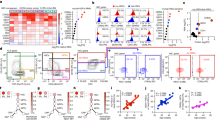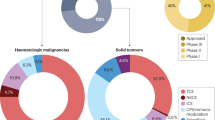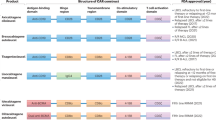Abstract
Production of monoclonal antibodies by hybrid cell lines1 provides a method potentially superior to conventional techniques for raising antisera2 in respect of titre and specificity. Many lines have been prepared3 that secrete antibody to cell-surface and soluble antigens and to viruses, but the products of hybridomas that recognize steroid haptens have not yet been exploited. Progesterone, the hormone of pregnancy, is essential for the establishment and maintenance of gestation in all mammalian species so far studied in detail4, and we describe here the production and characterization of an anti-progesterone monoclonal antibody which blocks the establishment of pregnancy in mice.
This is a preview of subscription content, access via your institution
Access options
Subscribe to this journal
Receive 51 print issues and online access
$199.00 per year
only $3.90 per issue
Buy this article
- Purchase on Springer Link
- Instant access to full article PDF
Prices may be subject to local taxes which are calculated during checkout
Similar content being viewed by others
References
Köhler, G. & Milstein, C. Nature 256, 495–497 (1975).
Milstein, C., Galfré, G., Secher, D. S. & Springer, T. Cell Biol. int. Rep. 3, 1–16 (1979).
Melchers, F., Potter, B. M. & Wagner, N. (eds) Lymphocyte Hybridomas (Springer, Berlin, 1978).
Heap, R. B., Perry, J. S. & Challis, J. R. G. in Handbook of Physiology: Endocrinology Vol. 2, pt 2, 217–260 (American Physiological Society, Washington, 1973).
McMaster, R. W. & Williams, A. F. Eur. J. Immun. 9, 426–433 (1979).
Galfré, G. & Milstein, C. Meth. Enzym. 73, 3–46 (1981).
Cotton, R. G. H., Secher, D. S. & Milstein, C. Eur. J. Immun. 3, 135–140 (1973).
Fantl, V. E., Wang, D. Y. & Whitehead, A. S. J. Steroid Biochem. 14, 405–407 (1981).
Seal, U. S. & Doe, R. P. in Steroid Dynamics (eds Pincus, G., Nakao, T. & Tait, J. F.) 63 (Academic, New York, 1966).
Finn, C. A. & McLaren, A. J. Reprod. Fert. 13, 259–267 (1967).
McCormack, J. T. & Greenwald, G. S. J. Endocr. 62, 101–107 (1974).
Gerber, G. B., Jacquet, P., Léonard, A. & Maes, J. C.r. Séanc. Soc. Biol. 173, 644–649 (1979).
Raziano, J., Ferin, M. & Van de Wiele, R. L. Endocrinology 90, 1133–1138 (1972).
White, A., Anderson, D. C. & Daly, J. R. J. clin. Endocr. Metab. 54, (in the press).
Heap, R. B., Holdsworth, R. J., Gadsby, J. E., Laing, J. A. & Walters, D. E. Br. vet. J. 132, 445–464 (1976).
Abraham, G. F., Swerdloff, T., Tulchinsky, D. & Odell, N. B. J. clin. Endocr. Metab. 32, 619–624 (1971).
Fisher, R. A. J. R. statist. Soc. 98, 39–54 (1935).
Author information
Authors and Affiliations
Rights and permissions
About this article
Cite this article
Wright, L., Feinstein, A., Heap, R. et al. Progesterone monoclonal antibody blocks pregnancy in mice. Nature 295, 415–417 (1982). https://doi.org/10.1038/295415a0
Received:
Accepted:
Issue Date:
DOI: https://doi.org/10.1038/295415a0
This article is cited by
-
Efficient production of cynomolgus monkeys with a toolbox of enhanced assisted reproductive technologies
Scientific Reports (2016)
-
The control of hyperacute rejection by genetic engineering of the donor species
Eye (1995)
-
Molecular basis of crossreactivity and the limits of antibody–antigen complementarity
Nature (1993)
-
Antifertility effect of progesterone antibodies in mice
Archives of Pharmacal Research (1989)
Comments
By submitting a comment you agree to abide by our Terms and Community Guidelines. If you find something abusive or that does not comply with our terms or guidelines please flag it as inappropriate.



